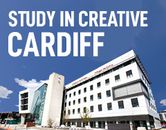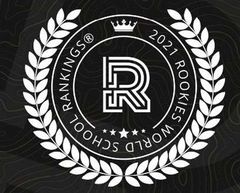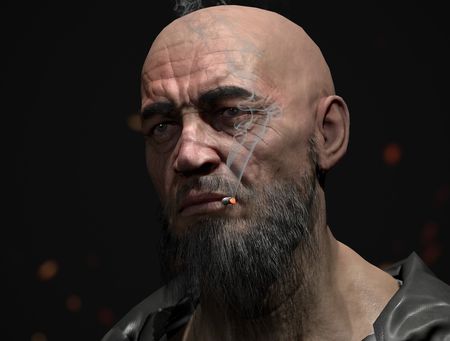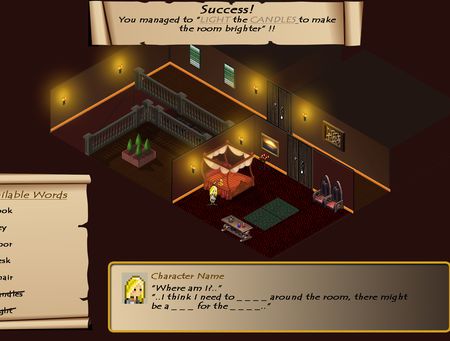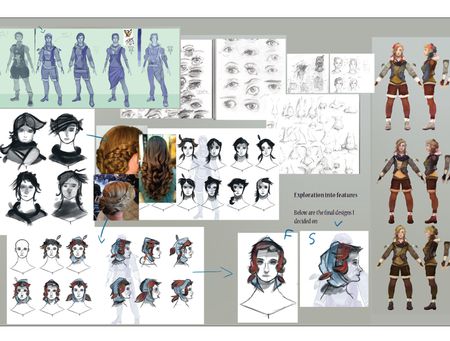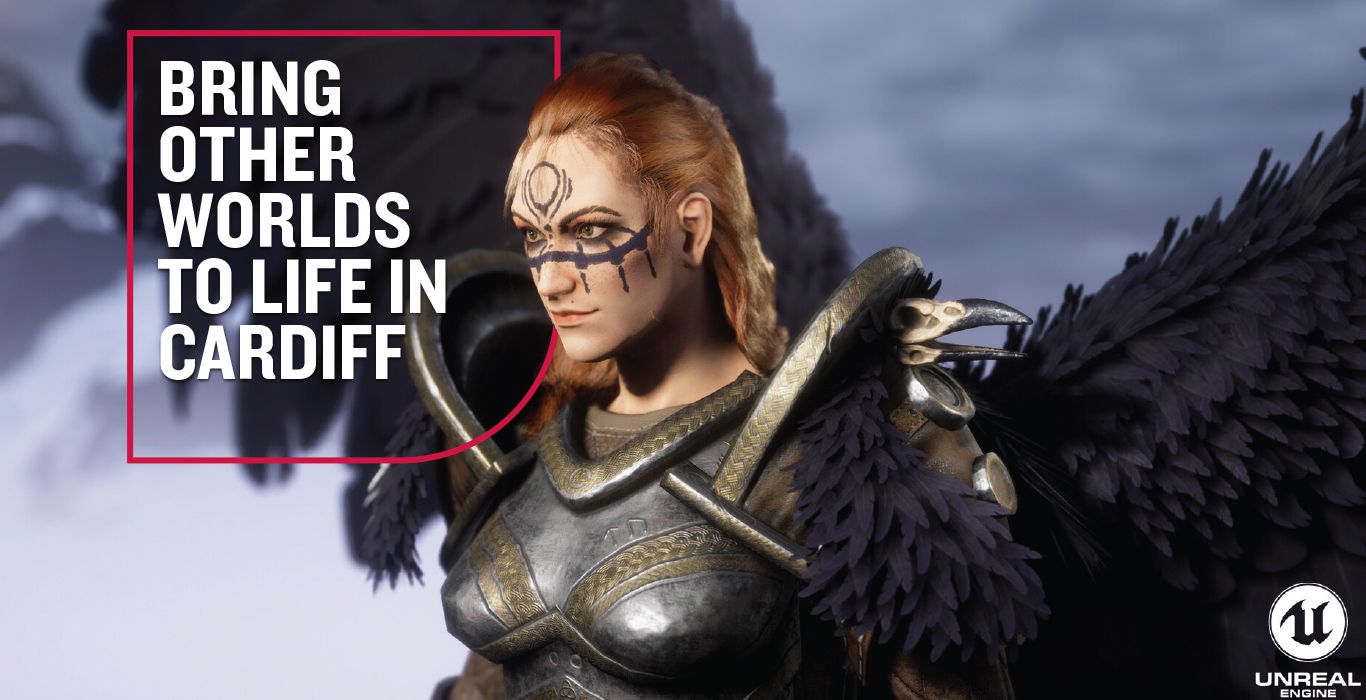
BA (Hons) Game Art
Computer Games and Animation is rated top in Wales for overall student satisfaction National Student Survey 2023
If you want to become a skilled and professional game artist, our BA (Hons) Game Art degree develops the creative and technical skills you will need.
You’ll develop traditional art skills alongside cutting-edge digital artwork. Your studies will also explore professional and theoretical elements of the games industry.
The Game Art course includes professional live briefs, competitions, game jams and project collaborations with other courses such as Games Design and Computer Animation to design, develop and publish games for PC, console and mobile games.
Our award-winning students have gone on to work for big-name studios including Ubisoft, Supermassive Games, Sega, Climax Games, Codemasters, Airship, Rockstar and more.
Typical Career Paths Include; Environment and level art, character art and design, concept art development, hard surface 3d modelling (weapons, vehicles), organic 3d modelling and further study e.g. MA, Msc.
See student and graduate work on: USW Games blog; ArtStation; Twitter and Instagram.
Top in Wales for Animation and Games (Guardian University Guide 2024)
| UCAS Code | Study Mode
2024 |
Duration | Start Date | Campus | Campus Code |
|---|---|---|---|---|---|
| W281 | Full-time | 3 Years | September | Cardiff (ATRiuM) | B |
| UCAS Code | Study Mode
2025 |
Duration | Start Date | Campus | Campus Code |
|---|---|---|---|---|---|
| W281 | Full-time | 3 Years | September | Cardiff (ATRiuM) | B |
Year one - The Fundamental Year
We introduce core art skills such as drawing, sculpting, 3D modelling and texturing, before progressing to technical software. You’ll study comparative anatomy, architecture, environmental art and vehicle modelling through projects.
Year two - The Advanced Year
It allows you to take a pathway towards your preferred skill set. All modules include industry simulation of concept art, advanced modelling and sculpting, 3D printing, motion capture, competitions and live briefs.
Year three - The Professional Year
This is your year! Year three gives you space and direction to produce specialized portfolios and games which support your applications for studio jobs. You may want to create a start-up business or move into postgraduate study. Whatever you decide, we have the support and experience to benefit your decision.
Collaboration and team working are an important part of the Games Industry and we have a range of projects which allow you to work alongside students from other disciplines.
Guest speakers, Alumni and demonstrations are integral to the course and happen throughout the academic year.
Year one: Game Art degree
● Introduction to Game Art
● 2D and 3D Game Art Production
● Technical Studies
● Character and Creature Design and Modelling
● Visual Studies for Game Art
● Game Art Studies 1
Year two: Game Art degree
● Advanced 2D and 3D Game Art
● Professional Practice (Game Art)
● Practice Based Techniques
● Game Art Studies 2
Year three: Game Art degree
● Game Art Project 1 - Preproduction
● Game Art Project 2 - Development
● Commercial Project
● Future Ready
● Critical Research: Computer Games
Teaching
Your practical work will be strengthened by taught modules in the culture and history of game-playing, which will give you a contextual background. There are also elements of business studies to ensure you have a thorough understanding of the industry and the computer games marketplace.
You will work on ‘Live’ projects with team pitches to industry studios. Studying through a combination of lectures, seminars and workshops, you will also participate in group and individual project work; supervised independent learning; open and resource-based learning; e-learning and production practice.
Assessment
You will be assessed 100% through coursework.
The course will use a combination of practical assessment criteria's which will include personal journals, portfolio output, team projects, reflective postmortems, presentations and essays.
Project work produced is driven by an industry context and assessed using both academic and industry expectations.
Accreditations
Approved Academic Partners with UnReal Engine
Placements
You can engage with industry through live briefs, industry visits and work placements, giving you valuable industry insight. Previous partnerships have included Tiny Rebel Games, Cloth Cat, Painting Practice.
Field Trips
As part of your studies we organise field trips and visits to help with your research and practice across many of the modules.
These have included - EGX Birmingham & London, Cardiff museum and art gallery, St Fagans National Museum of History, Bristol Zoo Gardens, Tramshed Tech, Caerphilly castle, National Waterfront museum, and others.
Lecturers
Tutors have many years' of experience in all areas of game art and have worked on projects for Codemasters, Pixologic, Allegorithmic, Disney, EA Games, Sega, Nickelodeon, Lego, The BBC and S4C amongst others.
Staff have successfully displayed work at the Tate, given lectures at Digital Art conferences, won BAFTAs and authored critical papers.
- Simon Reed, Course Leader
- Corrado Morgana, Academic Subject Manager
- Richard Hurford, Senior Lecturer
- Pierre Laffoux, Lecturer
- Brian Fagence, Lecturer
- Gina Carpenter, Lecturer
- Dann Rees - Lecturer
- Lloyd Jones - Lecturer
We regularly revalidate courses for quality assurance and enhancement
At USW, we regularly review our courses in response to changing patterns of employment and skills demand to ensure we offer learning designed to reflect today’s student needs and tomorrow’s employer demands.
If during a review process course content is significantly changed, we’ll write to inform you and talk you through the changes for the coming year. But whatever the outcome, we aim to equip our students with the skillset and the mindset to succeed whatever tomorrow may bring. Your future, future-proofed.
Contextual offers
We may make you a lower offer based on a range of factors, including your background (where you live and the school or college that you attended for example), your experiences and individual circumstances (as a care leaver, for example). This is referred to as a contextual offer and we receive data from UCAS to support us in making these decisions. USW prides itself on its student experience and we support our students to achieve their goals and become a successful graduate. This approach helps us to support students who have the potential to succeed and who may have faced barriers that make it more difficult to access university. Here is a link to our Contextual Admissions Policy.
Other qualifications and experience
We can also consider combinations of qualifications and other qualifications not listed here may also be acceptable. We can sometimes consider credits achieved at other universities and your work/life experience through an assessment of prior learning. This may be for year one entry, or advanced entry to year two or three of a course where this is possible.
To find out which qualifications have tariff points, please refer to the UCAS tariff calculator.
If you need more help or information or would like to speak to our friendly admissions team, please contact us here
Applicants in the UK
Selection for this course is based on a suitable application. If you do not meet the entry criteria, you may also be required to provide a portfolio of your work to help us assess your suitability for the course.
Applicants outside the UK
Selection for this course is based on a suitable application and submission of a portfolio of your work which the Course Leader confirms is suitable for an offer to be made.
Typical A-Level Offer
CCC to include a relevant art and design subject (this is equivalent to 96 UCAS tariff points).
Typical Welsh BACC Offer
Pass the Advanced Welsh Baccalaureate Diploma with Grade C in the Skills Challenge Certificate and CC at A Level with a relevant art and design subject (this is equivalent to 96 UCAS tariff points).
Typical BTEC Offer
BTEC Extended Diploma Merit Merit Merit in a relevant subject (this is equivalent to 96 UCAS tariff points).
Typical Access to HE Offer
Pass the Access to HE Diploma with a minimum of 96 UCAS tariff points
Additional Requirements
GCSEs: The University normally requires a minimum 5 GCSEs including Mathematics/Numeracy and English at Grade C or Grade 4 or above, or their equivalent, but consideration is given to individual circumstances
International Entry Requirements
We also welcome international applications with equivalent qualifications. Please visit the country specific pages on our international website for exact details.
English Requirements
In general, international applicants will need to have achieved an overall IELTS grade of 6.0 with a minimum score of 5.5 in each component.
However, if you have previously studied through the medium of English IELTS might not be required, but please visit the country specific page on our international website for exact details. If your country is not featured please contact us.
Full-time fees are per year. Part-time fees are per 20 credits. Once enrolled, the fee will remain at the same rate throughout the duration of your study on this course
August 2024 - July 2025 Fees
Full-time UK: £9000
Full-time International: £14950
August 2025 - July 2026 Fees
Full-time UK: TBC
Full-time International: TBC
Student Perks
At the University of South Wales, you’re investing in so much more than a degree. We strive to provide our students with the best possible experience, no matter what you chose to study. Whether it’s access to top of the range mac books and PCs, state-of-the-art facilities packed with industry-leading equipment and software, masterclasses and events led by industry experts, or a wide range of clubs and societies to meet likeminded people, better tomorrows start with extra perks.
Each course also has their own unique student benefits to prepare you for the real word, and details of these can be found on our course pages. From global field trips, integrated work experience and free course-related resources, to funded initiatives, projects working with real employers, and opportunities for extra qualifications and accreditations - at USW your future, is future-proofed.
Click here to learn more about student perks at USW.
Additional Costs
As a student of USW, you’ll have access to lots of free resources to support your study and learning, such as textbooks, publications, online journals, laptops, and plenty of remote-access resources. Whilst in most cases these resources are more than sufficient in supporting you with completing your course, additional costs, both obligatory and optional, may be required or requested for the likes of travel, memberships, experience days, stationery, printing, or equipment.
* Obligatory
| Item | Cost | |
|---|---|---|
| Kit (Uniform and Equipment) | £100 | Drawing Equipment (required all academic years) |
| Kit (Uniform and Equipment) | £500 - £1500 | PC Hardware (required all academic years) |
| Kit (Uniform and Equipment) | £10 - £20 | Software (required all academic years). Cost is per month. |
| Kit (Uniform and Equipment) | £100 | Wacom Tablet (required all academic years) |
| Kit (Uniform and Equipment) | £60 | USB Hard drive (required all academic years) |
| Kit (Uniform and Equipment) | £50 | Grad Show materials in year 3 |
| Kit (Uniform and Equipment) | £100 | Books (per year) |
| Field Trips | £100 - £1000 | Extra curricular trips . (All academic years) |
| Other: Misc. travel/ entry costs for visits | £0 - £100 | All academic years |
Funding
Funding to help pay for (or cover) course tuition fees and living costs
Whilst you’re studying, you’ll have two main financial obligations – tuition fees and living costs. There’s lots of financial help available from the University of South Wales and external funding sources, that may provide loans (which have to be paid back) and grants, scholarships and bursaries (that don't).
To learn about course fees, funding options, and to see if you are eligible for financial support, visit our Fees and Funding pages.
How to create a winning portfolio for Game Art
If you've been invited for an interview for our Game Art degree in Cardiff, you will need to bring with you a portfolio of work.
So what should you include?
"Show your enthusiasm for art and games, and talk through any personal projects. We want to see your passion shine through," says Simon Reed, Course Leader.
-Aim to include a minimum of around 8-12 pieces.
-Be organised.
-Put most recent and relevant work at the front. Work should show clear evidence of the logical progression of your ideas and creative ability.
-Demonstrate a range of design projects and drawing skills.
-Be prepared to talk these through with clarity, confidence and enthusiasm.
It’s fine to include work in progress, the development process of a project is just as important as the final ideas.
Try and show us a range of skills:
● Drawing - observational, figure, life drawing, landscape drawing, concept sketching or technical drawing.
● A range of 3D design, including model-making or product design, or sculpture. These can be photographed or documented in the portfolio as screenshot renders if too large to bring in.
● Experience of using computers and software - Photoshop and 3D modelling software would be desirable.
● An interest in game art and art in general, characters, graphic design, observational images and landscapes.
Bring sketch-books which show idea generation, drawings, personal and college projects. These can be any medium.
Come prepared
'Many people have a digital only portfolio. That's fine. We have facilities at the Atrium for your online work to be viewed, make sure you have a USB memory stick as a backup. Don't rely on your phone!'
UK students
Apply via UCAS if you are a UK residing applicant, applying for year one of a full-time undergraduate degree, Foundation Year, Foundation Degree or HND and you have not applied through UCAS before. If you are applying to study part-time, to top up your Foundation Degree or HND, or to transfer to USW from another institution, please apply directly.
International students and EU
Apply directly to the University if you live outside the UK.
The appetite for more visually realistic and imaginative games means that skilled and professional game artists are in demand in a number of areas including environment art, character art, concept design and vehicle production.
You will have the skills to work within game art, game design, animation, indie development and teaching.
Graduates have been employed at a range of cutting-edge computer game studios including Ubisoft, Creative Assembly, Rebellion, Codemasters, TT Games, Climax Games, Supermassive Games, Sega and Airship Images.
Our Careers and Employability Service
As a USW student, you will have access to advice from the Careers and Employability Service throughout your studies and after you graduate.
This includes: one-to-one appointments from faculty based Career Advisers, in person, over the phone or even on Skype and through email via the "Ask a Question" service. We also have extensive online resources for help with considering your career options and presenting yourself well to employers. Resources include psychometric tests, career assessments, a CV builder, interview simulator and application help. Our employer database has over 2,000 registered employers targeting USW students, you can receive weekly email alerts for jobs.
Our Careers service has dedicated teams: A central work experience team to help you find relevant placements; an employability development team which includes an employability programme called Grad Edge; and an Enterprise team focused on new business ideas and entrepreneurship.

